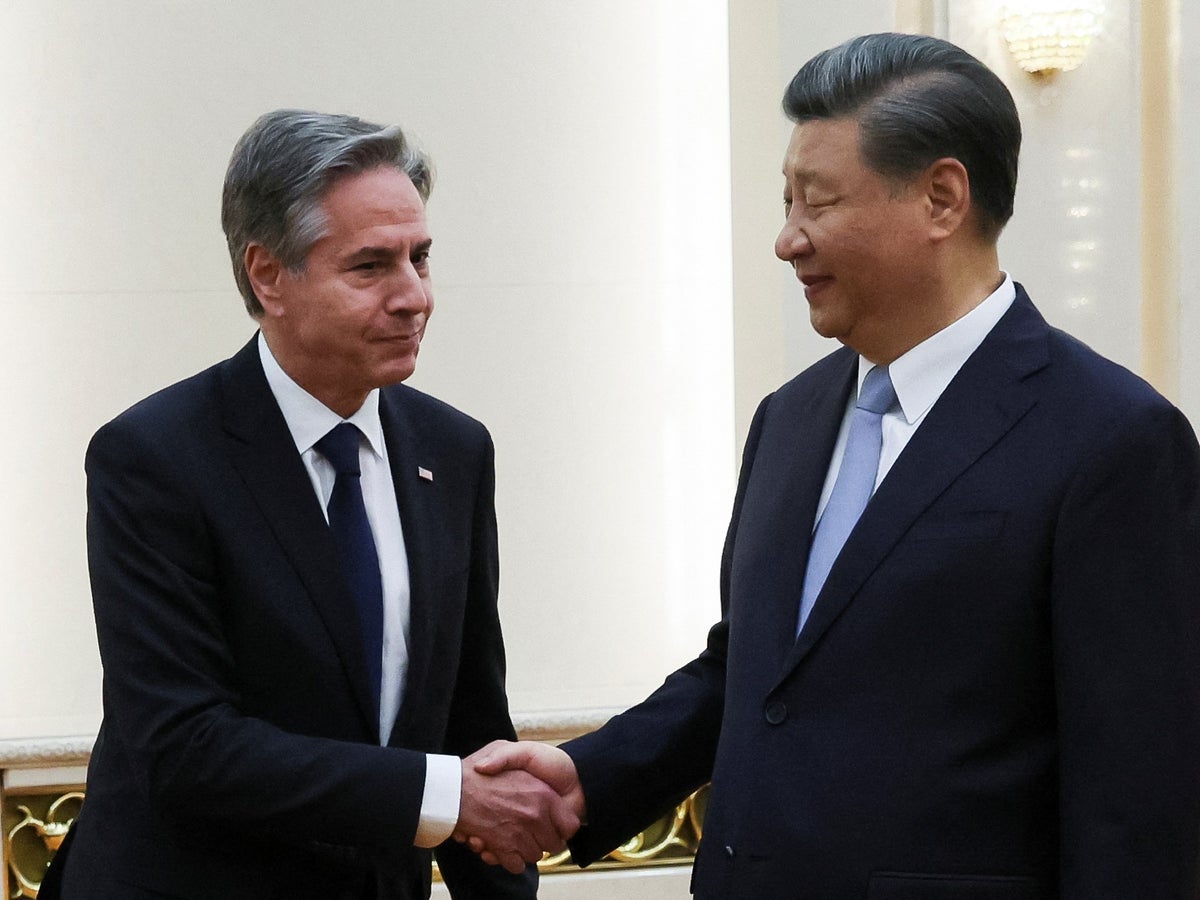
The US and China both see “progress” in patching up the acrimonious relationship between the two nations at the end of a high stakes visit to Beijing by Washington’s top diplomat.
The US secretary of state Antony Blinken met with China’s President Xi Jinping on Monday, restarting high-level communication between the two superpowers as they try to ensure their rivalry does not spiral towards conflict.
Both officials agreed on the need to “stabilise” bilateral ties and Mr Xi said the two sides “have also made progress and reached agreement on some specific issues” – although he didn’t elaborate on what that involved.
"The relationship was at a point of instability, and both sides recognised the need to work to stabilise it," Mr Blinken said before leaving the country. “My hope and expectation is: we will have better communications, better engagement going forward." He also suggested that both sides were open to more talks.
However, it is clear that significant challenges remain, given the depth to which diplomatic relations have sunk. Mr Blinken said that America is clear-eyed about the challenges that China poses.
Hours of talks across two days have seemingly done little to alter the entrenched views on both sides over a number of issues ranging from the status of Taiwan – which Beijing claims – to trade, human rights or their approach to the war in Ukraine. And there was no obvious breakthrough in that regard, despite Mr Xi’s words.
However, the fact that the discussions with some of Beijing’s top officials were so extensive on the first visit to China by a US secretary of state in five years – even if Mr Blinken only met Xi for 35 minutes – will only be seen as a positive by Washington. The constructive conversations mark a good step forward for US-Chinese relations, White House Press Secretary Karine Jean-Pierre said later on Monday. However, there will be some disappointment that China refused to entertain Mr Blinken’s bid to resume military-to-military communication channels, which have been paused for some time.
Mr Blinken said Washington had achieved its objectives for the trip, such as raising its concerns directly – which the State Department said also included North Korea’s provocations and US concerns with Beijing’s intelligence activities in Cuba. Mr Blinken’s original trip was postponed in February after a suspected Chinese spy balloon flew over US airspace.
Mr Blinken said that the aims of trying to set up channels for dialogue and exploring areas of cooperation were also progressing, but that it would not be straightforward.
“Progress is hard. It takes time. And it’ss not the product of one visit, one trip, one conversation.
According to a video posted online by Chinese state television, Mr Xi said that “the two sides agreed to follow through with the common understandings President Biden and I had reached in Bali [on the sidelines of a G20 summit in November].
Mr Xi said China “hopes to see a sound and steady China-US relationship” and believes that the two countries “can overcome various difficulties”, according to Xinhua.
Ahead of the meeting with Mr Xi, Mr Blinken met China’s top diplomat Wang Yi who took a harsher approach – saying that the US that the two nations “must take a responsible attitude toward the people, history and the world, and reverse the downward spiral of US-China relations.”
According to the nation’s state media, he also said “it is necessary for the US to reflect deeply and work with China to manage differences and avoid strategic surprises”.
Mr Wang spoke with Mr Blinken for more than three hours and told the US secretary of state that Washington must choose between “cooperation or conflict”.
“It is necessary to make a choice between dialogue and confrontation, cooperation or conflict,” he said. “We must reverse the downward spiral of China-US relations, push for a return to a healthy and stable track, and work together to find a correct way for China and the United States to get along”.
He also reportedly asked the US to stop speculating on the “China threat theory” and lift “illegal unilateral sanctions” against China.
On Sunday, Mr Blinken met with the Chinese foreign minister Qin Gang for seven and a half hours hoping to ease the tensions between the two sides.
Mr Blinken invited the Chinese foreign minister to visit Washington and the invitation was accepted, according to US state department spokesperson Matt Miller. He called the talks with Mr Qin “candid, substantive and constructive”.
“The Secretary invited foreign minister Qin to Washington to continue discussions, and they agreed to schedule a reciprocal visit at a mutually suitable time,” Mr Miller said. He added that Mr Blinken had emphasised the “importance of diplomacy and maintaining channels of communication across the full range of issues to reduce the risk of misperception or miscalculation”.
Mr Blinken stressed that “the need to reduce the risk of misperception and miscalculation” in his talks with Mr Qin on Sunday.
Beijing's tone on Taiwan was particularly pointed throughout Blinken's visit. "China has no room for compromise or concessions," Mr Wang told Mr Blinken, according to the Chinese readout of the talks.
The United States has long stuck to a policy of “strategic ambiguity” over whether it would respond militarily to an attack on Taiwan, which Beijing has refused to rule out.
Reuters and Associated Press contributed to this report







